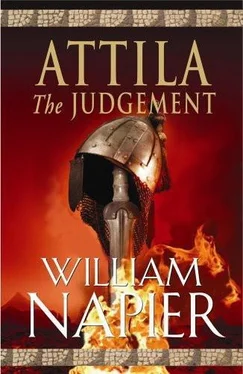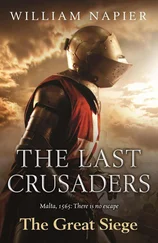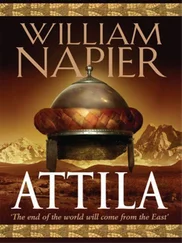William Napier - The Judgement
Здесь есть возможность читать онлайн «William Napier - The Judgement» весь текст электронной книги совершенно бесплатно (целиком полную версию без сокращений). В некоторых случаях можно слушать аудио, скачать через торрент в формате fb2 и присутствует краткое содержание. Жанр: Исторические приключения, на английском языке. Описание произведения, (предисловие) а так же отзывы посетителей доступны на портале библиотеки ЛибКат.
- Название:The Judgement
- Автор:
- Жанр:
- Год:неизвестен
- ISBN:нет данных
- Рейтинг книги:5 / 5. Голосов: 1
-
Избранное:Добавить в избранное
- Отзывы:
-
Ваша оценка:
- 100
- 1
- 2
- 3
- 4
- 5
The Judgement: краткое содержание, описание и аннотация
Предлагаем к чтению аннотацию, описание, краткое содержание или предисловие (зависит от того, что написал сам автор книги «The Judgement»). Если вы не нашли необходимую информацию о книге — напишите в комментариях, мы постараемся отыскать её.
The Judgement — читать онлайн бесплатно полную книгу (весь текст) целиком
Ниже представлен текст книги, разбитый по страницам. Система сохранения места последней прочитанной страницы, позволяет с удобством читать онлайн бесплатно книгу «The Judgement», без необходимости каждый раз заново искать на чём Вы остановились. Поставьте закладку, и сможете в любой момент перейти на страницу, на которой закончили чтение.
Интервал:
Закладка:
The Judgement
William Napier
LIST OF PRINCIPAL CHARACTERS
Characters marked with an asterisk were real historical figures. The rest might have been.
Aetius* – Gaius Flavius Aetius, born 398 in the frontier town of Silestria, in modern-day Bulgaria. The son of Gaudentius, Master-General of Cavalry, and himself later Master-General of the Roman Army in the West
Aladar – Hun warrior, son of Chanat, one of Attila’s eight generals
Amalasuntha* – only daughter of King Theodoric of the Visigoths
Andronicus – captain of the Imperial Guard, Constantinople
Arapovian – Count Grigorius Khachadour Arapovian, an Armenian nobleman
Ariobarzanes – Lord of Azimuntium
Athenais* – married to the eastern Emperor Theodosius II, and re-named Eudoxia
Attila* – born 398, King of the Huns
Bela – Hun general
Cadoc – a Briton, son of Lucius
Candac – Hun general
Chanat – Hun general, father of Aladar
Checa* – first wife of Attila
Chrysaphius* – a Byzantine courtier
Csaba – Hun general
Dengizek* – eldest son of Attila
Ellak* – son of Attila
Enkhtuya – a Hun witch
Galla Placidia* – born 388, daughter of Emperor Theodosius the Great, sister of Emperor Honorius, mother of Emperor Valentinian III
Gamaliel – an aged, well-travelled medical man
Genseric* – King of the Vandals
Geukchu – Hun general
Honoria* – daughter of Galla Placidia, sister of Valentinian
Idilico – a Burgundian girl
Jormunreik – Visigothic wolf-lord
Juchi – Hun general
Knuckles – baptised Anastasius, a Rhineland legionary
Leo* – Bishop of Rome
Little Bird – a Hun shaman
Lucius – also Ciddwmtarth, a British leader of his people
Malchus – a captain of cavalry
Marcian* – eastern Emperor, 450-457, married to Pulcheria
Nemesianus – a wealthy man of Aquileia
Nicias – a Cretan alchemist
Noyan – Hun general
Odoacer* – a Gothic warlord
Orestes* – a Greek by birth, Attila’s lifelong companion
Priscus of Panium* – a humble scribe
Pulcheria* – sister of Theodosius II
Romulus Augustulus* – the last emperor
Sabinus – Legionary Legate of the VII at Viminacium
Sangiban* – King of the Alans
Tarasicodissa Rousoumbladeotes* – Isaurian chieftain, also known as Zeno
Tatullus – First Centurion of the VII at Viminacium
Themistius* – an orator
Theodoric* – King of the Visigoths, 419-451
Theodoric* – Visigothic prince, eldest son of King Theodoric
Theodosius* – eastern Emperor, 408-450
Torismond* – Visigothic prince, son of King Theodoric
Valamir – Visigothic wolf-lord
Valentinian* – western Emperor, 425-455
Vigilas* – a Byzantine courtier
PART I
The Fury
1
The southern banks of the Danube, AD 449
A morning in early summer. The great river meandering slowly through the rich Moesian plains and eastwards to the Euxine Sea. A patchwork of ploughland and meadow, and further away from the town, blossoming orchards and copses of ancient woodland. The smaller River Margus flowing down northwards from the hills to join the majestic Danube.
Darting over the surface of the water, the bright green metallic flash of damselflies, and columns of tiny waterflies rising and falling in the warming summer air. Willows along the banks of the river and alders beside the damp streambeds. Black poplars releasing their fluffy white seeds in clouds, landing and revolving and floating on downstream. Minnows flashing and darting in shoals, trout in among the brown boulders, beautiful grayling. Nodding kingcups reflected in the water, and the meadows all around scattered with the yellow of marsh marigold and yellow flag. No sound but the wind rustling the reeds, or the single peep of a duckling as it raced over the water back to its mother, beating its stubby little wings to no effect.
Riverine nature so peaceful and serene on this morning in early May, that for a brief moment you might think yourself back in Adam’s Eden, long before the Fall.
And then the shadow of a heron over the waters, cruising in silent and low, its cold and passionless yellow eyes swivelling downwards in search of prey.
Come closer to the little town of Margus with its ancient walls and its cathedral tower with its solitary iron bell, and you hear the sound of human bustle and chatter. There are naked children laughing and splashing in the shallows, brown and shiny as pebbles, mischievously opening the sallow-wood fish-traps and letting the fish swim free. There is laughter on the roads, and then in the meadows stretching up to the walls of the town itself, laid out in many colours and resounding with the languages of many different peoples – the great and celebrated Margus fair.
A vast, rowdy, polyglot encampment, teeming with energy, enterprise and greed. Open-sided canvas tents and pied awnings and stalls of carved and painted wood. People buying and selling with clacking tongues and a whole grammar of gestures and winks and hand signals. Buyers slowly producing worn leather purses from inside their robes, and sellers biting coins to test their worth – plenty of bronze coins around that have been washed with arsenic to make them pass for silver. Fur merchants from the far north, from beyond the Roman Empire, selling bearskin and marten, beaver and sable. Bright-eyed songbirds whistling in their osier cages. Everywhere the savour of smoking fish and roasting meat, and girls selling slugs of wine straight from the barrel in wooden cups. More elaborate inns and taverns under canvas. Pickpockets, of course, preying on the drunk and unwary, and women looking for husbands or at least money, walking light-stepped and lazy-eyed, swaying their hips between the groups of men.
Further off, the warm ripe smell of livestock in wooden corrals. Cattle dealers and sheep sellers communicating in their secret language and occult numbers, with barely discernible nods and winks for deals. And the air everywhere filled with greetings and curses, jests and lewd remarks, the high piping cries of excited children, the cackle of geese, and a single screaming monkey in a cage. From the land of the Nubians, so the monkey-seller said, without any great conviction. The monkey reached out its paw and pulled the hair of unwary bystanders. And all this ripe human chaos under the supposed regulation of a handful of frontier troops from the towering legionary fortress of Viminacium, ten miles east.
There was a girl there, a gentle, dreamy girl with a hare-shot lip, because a hare had walked across her mother’s path when she was pregnant with her. So they said. She carried a yoke of wooden pails and sold goat’s milk by the cupful, but she was not in truth a bold or assertive seller and she made little money. She too frequently gave cupfuls of milk away to hungry-eyed, plaintive children pestering her. When she returned at the day’s end, her mother would scold her for not having sold enough, accusing her of daydreaming her days away. And scold her even more for not having found a husband to take her off her poor old mother’s hands.
She disliked jostling crowds, and was drawn to the edge of the fair where the gaudy tents and stalls gave way to open meadows, and then the low line of the hills to the west, and the jut of Mons Aureus, the mountain of gold, with its fabulous mines. The vaults of Viminacium were full of gold, so they said. When it was transported down the great imperial trunk road to the emperor in Constantinople, it went with an escort of a thousand men. And the emperor… the girl always imagined him as made of gold himself, seated on his high throne covered in gold leaf, like a statue, immobile, unapproachable. A living god.
Читать дальшеИнтервал:
Закладка:
Похожие книги на «The Judgement»
Представляем Вашему вниманию похожие книги на «The Judgement» списком для выбора. Мы отобрали схожую по названию и смыслу литературу в надежде предоставить читателям больше вариантов отыскать новые, интересные, ещё непрочитанные произведения.
Обсуждение, отзывы о книге «The Judgement» и просто собственные мнения читателей. Оставьте ваши комментарии, напишите, что Вы думаете о произведении, его смысле или главных героях. Укажите что конкретно понравилось, а что нет, и почему Вы так считаете.












